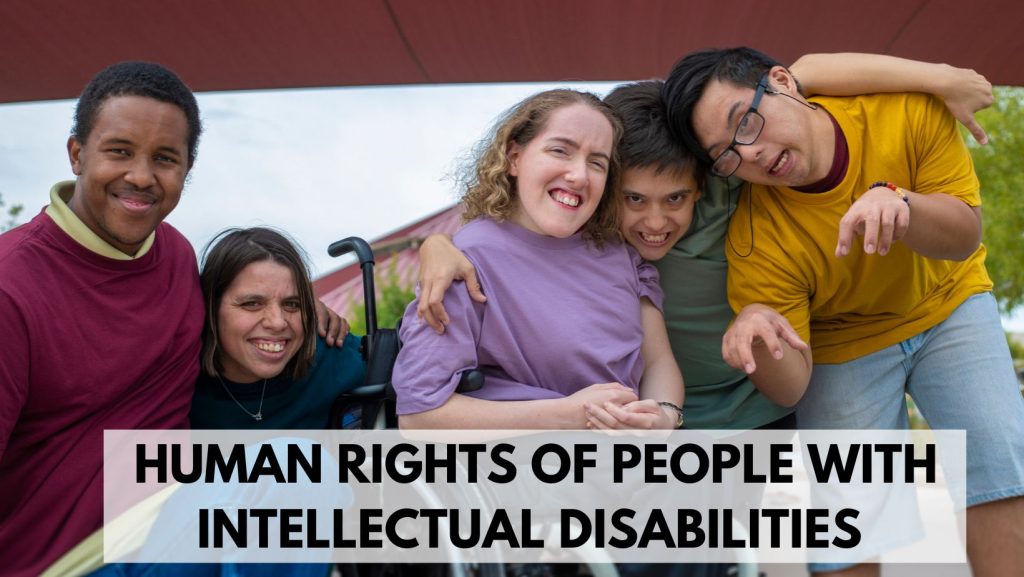
“Human Rights are the federal, state, and case laws that provide basic protections to all citizens. These basic protections help make sure that all citizens have equal opportunity to pursue, “life, liberty and the pursuit of happiness as defined in the Declaration of Independence and by the Constitution”. People with disabilities have the same human rights as any other American citizen!” [1]
“One of the purposes of the United Nations is to “reaffirm faith in fundamental human rights, in the dignity and worth of the human person …”, as stated in its 1945 charter. The UN’s Universal Declaration of Human Rights (1948) includes recognition of the inherent dignity and worth of, and equal and inalienable rights of, all members of the human family as the foundation of freedom, justice, and peace in the world. The Declaration, which the United States ratified in 1992, holds that human rights should be protected by law.” [2]

Disability Laws
“A variety of laws have been created to make sure that people with disabilities are able to exercise and enjoy the same rights that all people exercise and enjoy.
Examples of National Disability Laws
• Rehabilitation Act of 1973
• Individuals with Disabilities Act (IDEA)
• Voting Accessibility for the Elderly
• Americans with Disabilities Act of 1990 (ADA) and Handicapped Act of 1985
• Americans with Disabilities Act of 1990 (ADA)
• National Voter Registration Act of 1993
• Assistive Technology Act of 1998” [3]

Rights Summary
“People with intellectual and/or developmental disabilities1 have the same basic legal, civil, and human rights as other citizens. They may need accommodation, protection, and support to enable them to exercise these rights. Their rights should never be limited or restricted without due process.” [4]
- “Advocacy: Advocacy is essential for promoting and protecting the civil and human rights of people with intellectual and/or developmental disabilities (IDD). All advocacy efforts by, with, and on behalf of people with IDD must be centered around the views, needs, expressed interests, and leadership of self-advocates.
- Anti-Racism: Anti-racism means being committed to the daily work of identifying and disrupting racism in both its implicit and explicit manifestations. This includes looking at public policy work with an intersectional lens, considering the intentional or unintentional impact upon people of color with intellectual and/or developmental disabilities (IDD).” [4]

- Autonomy, Decision-Making, Supports, and Guardianship: “Legally, each individual adult or emancipated minor is presumed competent to make decisions for himself or herself, and each individual with IDD should receive the preparation, opportunities, and decision-making supports to develop as a decision-maker over the course of his or her lifetime.” [4] “However, some people with disabilities are unable to make decisions and manage their life without support from others. In these situations, the probate court may decide to appoint a plenary or limited guardian to assume responsibility for certain decisions regarding a person’ life. A guardian has no more power than the state would have to interfere with a person’s basic human rights.” [1]
- “Criminal Justice System: People with intellectual and/or developmental disabilities (IDD) have the right to justice and fair treatment in all areas of the criminal justice system, and must be afforded the supports and accommodations required to make justice and fair treatment a reality.” [4]

- Human and Civil Right: “All people have human rights and are entitled to the protection and benefits of the civil rights laws of their country. This includes people with intellectual and/or developmental disabilities (IDD).” [4]
- Inclusion: “All people with intellectual and/or developmental disabilities benefit when fully included in community life.” [4]
- Physician-assisted suicide: “Physician-assisted suicide must be prohibited for people with intellectual disability (ID) due to the inherent risk of undue influence.” [4]
- Protection from Mistreatment: “People with intellectual and/or developmental disabilities must be free from abuse, neglect, or any kind of mistreatment.” [4]
- Self-Advocacy: “People with intellectual and/or developmental disabilities (IDD) have the right to advocate and/or be supported to act as self-advocates. [4]
- Self – Determination: “People with intellectual and/or developmental disabilities (IDD) have the same right to, and responsibilities that accompany, self-determination as everyone else.” [4]

“All people with intellectual and/or developmental disabilities have the right to accommodations, assistance, and supports they need to exercise and ensure their human and civil rights. Local, state, federal, and international governments must strongly enforce all human and civil rights.
Policy makers must act to ensure that human rights are protected by law; that any gaps or failures in the law are corrected; and those laws are enforced by respectful and knowledgeable authorities.” [1]

Resources
[1] https://portal.ct.gov/-/media/DDS/FactSheets/HumanRightsSheet.pdf
[2] https://www.aaidd.org/news-policy/policy/position-statements/human-and-civil-rights
[3] https://portal.ct.gov/-/media/DDS/FactSheets/HumanRightsSheet.pdf
